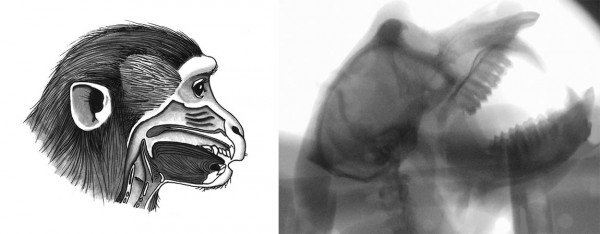By Ana Verayo, | December 12, 2016

Researchers have found that monkeys known as macaques possess the vocal anatomy (left) but not the brain circuitry to produce human speech. (University of Austria/Asif Ghazanfar)
In a unique discovery, scientists have revealed that monkeys such as Old World macaques have the ability to talk based on their vocal tract structure. However, their brains are not wired for speech.
In this new study, researchers suggested that cognitive differences among humans and primates or other animals could explain why humans can support language and not just possessing vocal adaptations to produce sounds.
Like Us on Facebook
According to Asif Ghazanfar of Princeton University's Neuroscience Institute, even if monkeys possess the vocal anatomy to speak, there should be a crucial link to the brain for language to emerge fully. These findings may be only applicable to macaque monkeys, but it still debunks the idea that vocal anatomy limits speech in animals.
Now, scientists aim to identify what is it about the brain that allows humans to speak.
A team from Princeton University studied the macaque vocal tract with the help of X-rays to measure tongue movement as well as the lips and larynx when macaque monkeys produced vocalizations. Using a unique model, the team was able to create simulations of vocalizations based on the vocal tracts of the monkeys.
The results of the model revealed that macaques have the physical capability to create vowel sounds and even vocalize full sentences only if they possess the required brain circuitry.
Around 40 million years ago, humans and macaques separated lineages. Chimpanzees diverged from these lineages some seven to 13 million years ago. Scientists continue to study the brains of Old World monkeys to understand how cognition became the key to language and when it first emerged during this evolutionary timescale.
According to psychology professor Laurie Santos of Yale University, who was not part of this study, this new study can search for the key to why humans possess this unparalleled language ability. Since macaques are as old as humans as a species, it is crucial to find out why macaques have a vocal tract ready for speech and why later primates do not possess the ability to make the kinds of speech sounds that humans can produce.
This new study was published in the journal Science Advances.
-
Use of Coronavirus Pandemic Drones Raises Privacy Concerns: Drones Spread Fear, Local Officials Say

-
Coronavirus Hampers The Delivery Of Lockheed Martin F-35 Stealth Fighters For 2020

-
Instagram Speeds Up Plans to Add Account Memorialization Feature Due to COVID-19 Deaths

-
NASA: Perseverance Plans to Bring 'Mars Rock' to Earth in 2031

-
600 Dead And 3,000 In The Hospital as Iranians Believed Drinking High-Concentrations of Alcohol Can Cure The Coronavirus

-
600 Dead And 3,000 In The Hospital as Iranians Believed Drinking High-Concentrations of Alcohol Can Cure The Coronavirus

-
COVID-19: Doctors, Nurses Use Virtual Reality to Learn New Skills in Treating Coronavirus Patients







